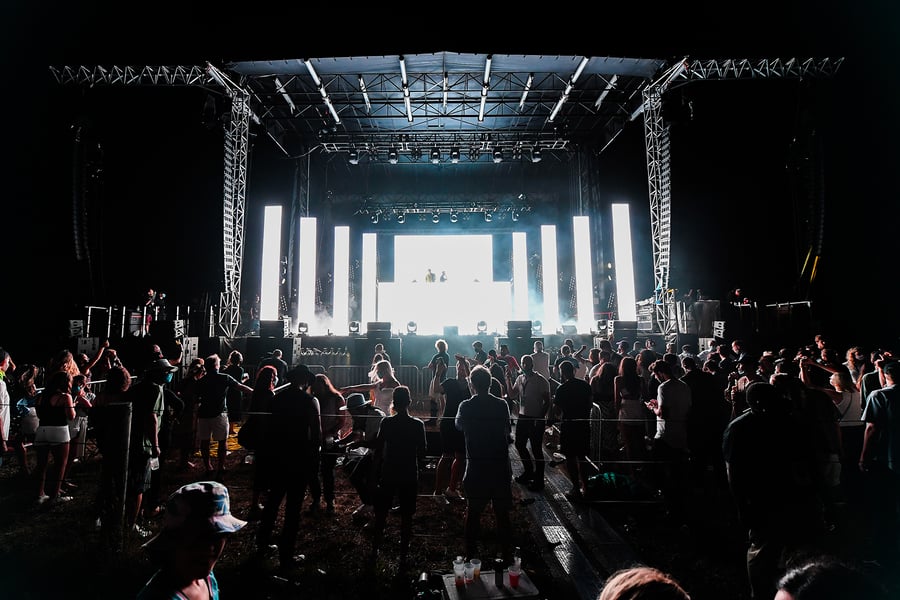Last weekend, the Chainsmokers headlined an outdoor charity concert in the Hamptons that was touted as a drive-in show where guests would be allowed to sit outside their cars in designated areas that were at least six feet apart. Still, photos and videos from the event showing packed crowds with few people wearing masks quickly went viral on social media.
Organizers In the Know Experiences and Invisible Noise were adamant that they followed all the proper protocols and guidelines for hosting an event during the COVID-19 pandemic: “The video that everyone is talking about was taken from an angle that doesn’t properly convey how careful we were to follow the guidelines created by the CDC,” they wrote in a statement to Billboard. “We did everything in our power to enforce New York’s social distancing guidelines and collaborated with all state and local health officials to keep everyone safe.”
“We followed all proper and current protocol, including spacing each spot more than six feet apart, positioning sanitizing stations throughout the open grounds, temperature checks for all attendees, sanitization of restrooms every 10 minutes, local security enforcing guests to wear their masks both in and out of their designated areas, contact tracing, clearly marked parking zones, as well as providing complimentary face masks upon arrival,” they added.
Nevertheless, the footage garnered the ire of New York Governor Andrew Cuomo, who said he was “appalled” at the event, as well as Department of Health Commissioner Howard A. Zucker, who immediately launched an investigation. Amid the controversy, the organizers and Southampton town supervisor Jay Schneiderman — who also performed at the gig with his band — have defended the concert. But in a new op-ed for Rolling Stone, Zucker explains why the show put New York’s “months-long work to flatten the curve and contain the virus” at risk.
With video footage clearly showing social distancing and safety precautions ignored, the recent “Safe & Sound” Chainsmokers charity concert in Southampton mocks New Yorkers’ months-long work to flatten the curve and contain the virus.
This event was professionally organized with the involvement of Southampton’s town supervisor. With this kind of popular entertainment, it is hard to imagine how gathering thousands of young people at a drive-in event would not be a public-health threat.
Who or what system would enforce social distancing? This is not just a lack of common sense, but an illegal and reckless endangerment of public health. As commissioner, I have directed the Department of Health to conduct an investigation of how this rule-flouting event was able to get off the ground.
Love Music?
Get your daily dose of everything happening in Australian/New Zealand music and globally.
During the pandemic and lockdown, I have thought a lot about the meaning of “public.” My job as commissioner is to monitor health issues that are essentially public — threats or conditions that affect the greatest number of residents in our state.
One of the first official letters I wrote growing up in the Bronx was to Mayor John Lindsay, when I tripped on an upturned sidewalk block and hurt myself. As an elementary school kid, I knew I would heal up OK. But what if it was an older person who tripped, or a pregnant lady?
The critical thing about identifying yourself as a member of the public is taking responsibility for everyone else within this broad category. We are all its gatekeepers; the public is only as strong and as resilient as we make ourselves.
I will always believe in the goodwill and wisdom of the greater public. There is a lot of selfishness in our culture, but my training in public health allows me to focus on the wellbeing of large populations — essentially that which unites all of us.
I became angry when I learned of the actions of the Southampton concert promoters and the flagrant disregard for the public’s health during a pandemic. But I was heartened by the fact that most of the people who read or heard the story have felt the same way.
“This is not just a lack of common sense, but an illegal and reckless endangerment of public health.”
I think what struck our collective nerve was seeing so many with so much to their advantage — concert attendees were generally young, healthy, and, as indicated by the $850 ticket prices, able to afford health care if they should need it — be so cavalier about taking a risk that could have dire consequences for many.
You don’t have to be the commissioner of health to realize that when it comes to contracting and transmitting a contagious and dangerous disease, every one of us is a card-carrying member of the rank-and-file. COVID-19 is an equal-opportunity infector: It doesn’t recognize skin color or the thickness of stock portfolios.
And when this disease spreads, it is more devastating to people who are not young and healthy. It is more devastating to people who cannot afford $850 tickets to a charity event — namely, working minority populations in underserved communities whom we have seen to be at heightened risk for infection, hospitalization, and death from COVID-19.
Ultimately, the irresponsibility of the Hamptons partiers could have a ripple effect that goes back to harm those who have already suffered the most from this pandemic. This lack of respect for the sacrifices so many have made and this general lack of caring is why this story about public irresponsibility troubles us so much.
But, as I said, I believe in in the goodwill and wisdom of the greater public.
New York has gone from the worst afflicted to the best managed state during this crisis. We are now ahead of the virus rather than catching up behind it, and we are determined not to lose this advantage as we work to keep all New Yorkers safe.
Dr. Howard A. Zucker is Commissioner of Health and the state’s chief physician for New York State.
From Rolling Stone US



































